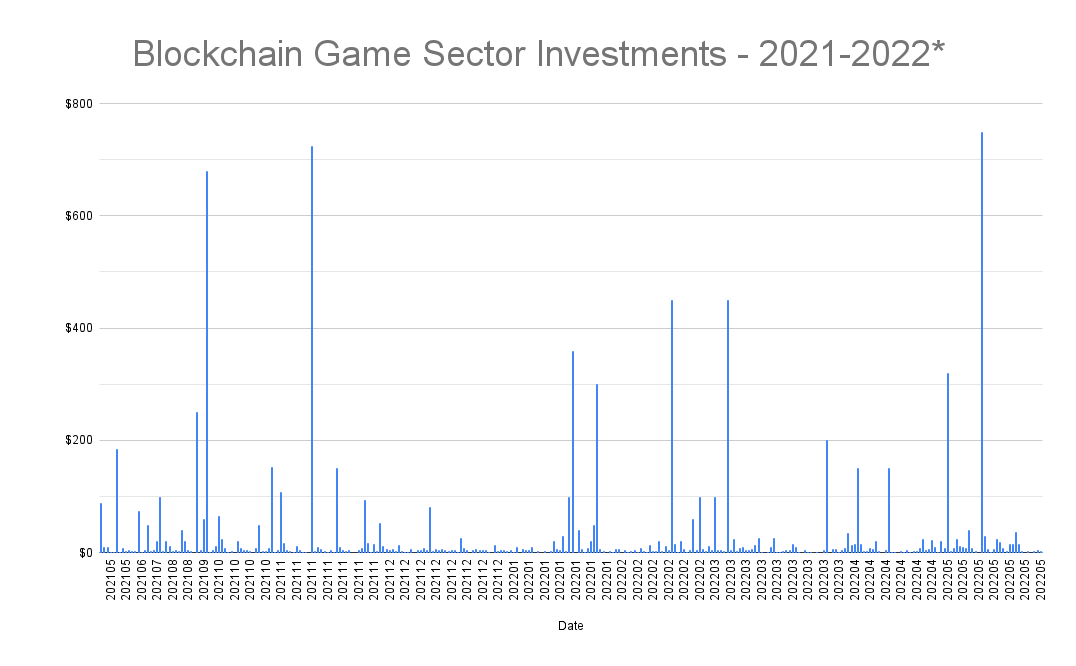Headline aside, it’s just a symbolic number: nevertheless the blockchain gaming sector (including metaverses etc) has broken the $5 billion mark for publicly announced investment in 2022 to-date.
This compares with $4.1 billion for the whole of 2021.
These are proprietary numbers I’ve gathered from public sources, which likely underestimate the level of crypto investments via NFT sales and IDOs by around $100 million.
However the vast majority of investment activity during 2022 — c. 90% — has been through traditional VCs.
In terms of the monthly breakdown for 2022, it goes like this…
January: $1,030 million
February: $777 million
March: $1,013 million
April: $555 million
May: $1,394 million
June*: $242 million
Of course, how the rest of 2022 looks is anyone’s guess. Given investments announced now are likely to be a couple of months old in terms of money transfers, we won’t get much idea of a slowdown until maybe as late as September.
Similarly, VCs have announced more than $3 billion raised for new funds for gaming and metaverse during 2022 so there’s still plenty of capital to be deployed, although presumably the taps for IDOs and big NFT sales will dry up more quickly.
Dicing the data in another way, this is what it looks like in terms of the size lumpiness of the announcements — lots of small seed deals and a few massive ecosystem and platform bets.
And, yes, extra marks for noticing this graph is an unlabelled, work-in-progress…
This Substack is sponsored by Hiro Capital, which, alongside Knollwood Advisory, Boost VC, Com2uS and Skydance Entertainment, was an investor in Skybound Entertainment’s (The Walking Dead, Invincible etc) most recent venture round.
Funding news
US outfit Saga has announced a $3.6 seed funding round for its Soulbound platform. Animoca Brands led the round, which was filled by crypto degens such as NGC Ventures, Panony, Genblock and Delta and SL2, plus guilds like Rainmaker and AAG.
As for Soulbound, it feeds into the trend about what guilds do next following the failure of large scale extractive P2E gaming. It’s a cross-chain platform that allows players to share their in-game expertise and reputation across different games as they level up their profile via a ‘proof-of-play’ system using Soulbound’s M-XP token.
In this way, games and guilds can set up incentivized in-game quests or social activities, which once completed are rewarded with off and on-chain assets.
More generally, the term Soulbound has become very popular in crypto circles thanks to a recent discussion from Vitalik Buterin about ‘items which can not be transferred between players’.
File Under Metaverse news
PUBG company Krafton has released the first images of Ana, its virtual human that it hopes will “engage a global audience and help establish Krafton’s Web 3.0 ecosystem”.
Driven by deep learning and created, rigged and animated in Unreal Engine, Ana will release music and act as an influencer across entertainment and esports.
Product news
Given the sharing of NFTs via a QR code was a key driver of Axie Infinity’s success for guilds, it’s a surprise more games don’t have similar features.
But PC vehicle shooter War Riders has just added such a thing. Noting that up-to-this-point, players had just been sharing passwords, it’s launched its new secure share access, which allows up to 10 players to share an account and assets in the in-game wallet, but only the account creator has access to NFTs held in the external linked Ethereum wallet.
Solana-based browser FPS Mini Royale has announced a partnership with Chinese outfit Sank Toys, which has as its signature marker characters wearing deepsea diving helmets.
The collab will launch on 7th July alongside a new arena map and quests that will be rewarded with rare Sank-themed weapons and skins, although you’ll need to own one of the Sank Hero NFTs to participate.
OpenSea has announced it will be transiting from the Wyvern protocol to its own open source Seaport protocol; something it predicts will save users around 35% in gas costs.
Sellers will have to pay a one-fee to use Seaport, but as well as lower gas fees, it will enable users to make offers on entire collections, acquire partial items from a collection, eliminate initiation fees, and make wallet signatures easier to understand.
More generally, OpenSea hopes Seaport — which is currently undergoing a two week audit backed by a $1 million prize pool — will evolve to allow more flexible and complex NFT trading use cases.
Replacing Discord news
Blockchain analytics platform Nansen has announced its Nansen Connect messaging app.
Labelled “a crypto-native communications hub”, it requires users to log in with a crypto wallet (currently Metamask) and then lets them connect to groups based on their NFTs and tokens. This could include limiting access to certain groups unless you hold a specific asset in your wallet.
The news comes as problems with Discord range from the sprawling scale of many game channels to regular hacks, especially on blue chip NFT collections such as Bored Apes.
Nansen Connects will initially be limited to existing users of Nansen’s paid services (from $1,600 annually or get a 7-day trial for $9) as well as holders of high-end NFTs. Projects such as Pudgy Penguins, Hashmask and CyberKongz have confirmed their plans to use it as their official community channel.






